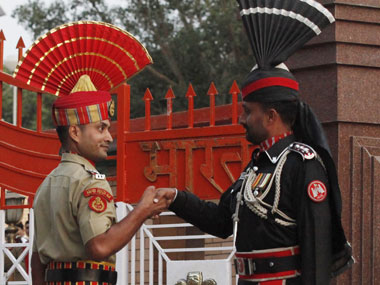If we skim through the Bollywood jingoism that most India-Pakistan comparisons necessitate, we arrive at a zealously guarded line of control around which, halves of once-a-whole nation, grow, fight their demons and with each passing day and each new policy made to corner each other, grow apart. Some suspect, irreversibly. M J Akbar in his opening piece in ‘Worlds Apart’, the Independence Day special issue of the India Today magazine, asks, if we are essentially people with similar emotional wiring, ‘similar personality strengths and parallel collective weaknesses’, why have India and Pakistan walked completely different paths down nation building in the past 65 years? The issue attempts to address the handful of differences in the countries’ ideas of nationhood, approach to society and understanding of freedom, which have set them on different political, ideological paths. Akbar begins by exploring how Jinnah and Gandhi’s theories of nationhood were ‘mirror images’. While Gandhi wanted a united, secular India with a Hindu majority, Jinnah too had imagined Pakistan as a secular state with a Muslim majority. However, there was a glaring difference in their near-similar ideas of nation building. Akbar notes, “Jinnah’s state was exclusive, Gandhi’s India was inclusive.” [caption id=“attachment_417323” align=“alignleft” width=“380”]  Indian and Pakistani security personnel at the Wagah Border. Reuters.[/caption] A supplementing article by Gopalkrishna Gandhi, Gandhi’s great grandson, puts together an imaginary conversation between two starkly different people made to share a political trajectory. And a little predictably, the conversation ends with the two political leaders who died before the countries they had envisaged became republics, expressing their disappointment about how India and Pakistan had shaped up. Mark Tully, in his appropriation of dynastic politics in India in his article ‘It Runs In The Family’, notes how dynasties form the bedrock of party dynamics in India and while it helps parties dig their feet firmly into the ground, democracy become a casualty. In tracing how political hegemony is as good as a heirloom among the Indian political classes, Tully cites the example of a once-reluctant Sonia Gandhi’s curtailing of Congress PM Narsimha Rao’s authority. He asks, “Who’s to know where Congress would have been today if Sonia hadn’t eventually decided to pull off a coup and take control of the family party?” The country’s obsession with Rahul Gandhi’s political career and Priyanka Gandhi’s shadow-play in the party just confirms Tully’s point that not only parties themselves, in popular imagination too, political parties are bastions of ‘families’ - a card that possibly plays well on the rooted-in-families middle class and lower middle electorate in the country. However, Tully notes how that prevents national parties from spreading wings in regional politics, widely enough to weather formidable regional forces like Karunanidhi, or Mulayam Singh Yadav in Uttar Pradesh or for that matter Mamata Banerjee in West Bengal now. “Congress is suffering because Indira Gandhi laid down the rule that no Congress politician should be allowed to become a regional political dynast,” notes Tully. Khaled Ahmed, in his analysis of dynastic politics in Pakistan, notes how in Pakistan, dynastic politics in a democracy that Pakistan claims to be ‘arouses two negative pathologies’. “One is principled - hatred, stemming from violation of the spirit of transition of power under the Constitution; the other visceral - nursed by political rivals defeated by lineal magnetism,” says Ahmed. In the comparison of the judiciary in the two countries, Yasser Latif Hamadani, a Lahore-based lawyer observes how the Pakistan judiciary with the Supreme Court at the helm of things have deserted objectivity and British notions of justice to actively intervene and challenge national politics. Instead of being a voice of reason, the judiciary of Pakistan has turned into an aggressive institution involved in active politicking and a relentless pursuit of their own idea of nationhood. “In the recent years, the judiciary has grown more confident and and is a real threat to the functioning of democracy in Pakistan,” sums up Hamadani. On the other hand, the Supreme Court of India continues to be a largely apolitical presence in the democratic system of India, necessary to keep governments and politics grounded to mass aspirations. However, Fali S Nariman in his article Justice Always Needs Courage, says how the complicated procedures involved in reform and upgrade of dated laws, have fettered the institution over years. An article by Shehrbano Taseer, called Where Every Day is a Battle, a very important aspect of social living is explored - freedom of women. Taseer explains how religious fanaticism makes life a trial for Pakistani women and that remains as one of the biggest failures of its democratic system. Internal insurgency, as noted in the issue, is a standing problem in both the countries. But like the Taliban have managed to snatch the popular sympathy away from the government in large sections of the religiously volatile country that Pakistan is, the Maoists, in spite of their valid criticism of the shameful failures of the government’s development policies, have mostly been slammed for raging a bloodied war against security forces and victimizing the same economic section of the country they come from. The Worlds Apart edition of India Today is not available for free download online. However, a digital edition can be purchased from the India Today site.
Why have two countries which are almost cultural echoes of each other, moved apart to a point of no return?
Advertisement
End of Article


)
)
)
)
)
)
)
)
)



